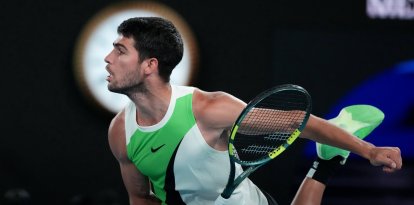Bureaucracy hinders the construction of Inter Miami's new stadium as Messi's time runs out
The team, owned by the Mas brothers and David Beckham, wants to finish their new home before 2025, when the Argentine star's contract expires.

Bureaucracy hinders the construction of Inter Miami's new stadium as Messi's time runs out
On Monday, August 28, Inter Miami CF proudly announced that it officially began construction of its new stadium, Miami Freedom Park.
The new home of Leo Messi's team, valued at $ 350,000,000, would be completed and ready to open its doors in 2025, according to the club's official statement.
The complex, which will be a 131-acre development with a new 25,000-seat soccer stadium, will also feature a leisure district and a public park that will be "the largest in Miami."
In total, the entire project will cost about $1 billion.
As announced by the team owners, famed Mas brothers, and former footballer David Beckham, the complex is intended to offer "a full range of entertainment and commercial offerings including office space, hotel, shops, restaurants and additional experiences and attractions."
However, the project, which looks remarkable, is encountering an obstacle along the way: Miami-Dade County bureaucracy.
According to a newspaper report, The Wall Street Journal, 2025 is not a random date, as it is when Leo Messi's contract with Inter Miami ends. The club wants to finish its expensive project before the end of their contractual link with the Argentine star, who has completely revolutionized the U.S. soccer market, recently propelling his team to sporting success just weeks after his official debut.
But the situation is complicated, according to the WSJ, Miami-Dade County is imposing various bureaucratic obstacles to construction, putting into question when Inter Miami's new home will be completed.
2025 or 2026?
According to the WSJ report, the project has already received the backing of local authorities and zoning changes have been introduced.
"But environmental approval as well as logistical issues remain before stadium construction can begin, according to Miami-Dade County officials," the newspaper page reads.
According to the report, unless Messi renews with Inter Miami, a situation that will depend on the player's desire to continue competing and with an eye on the 2026 World Cup, the project will be expensive due to having to bring the public to the sports complex without the presence of the Argentine star.
In fact, some urbanization experts don't see this feasible, as the timeline to complete the sports complex is unrealistic.
"Howard E. Nelson, a lawyer at Bilzin Sumberg who concentrates on environmental law and land development, says at least three years is more realistic. That timeline would push the completion date into August 2026, well past Messi’s contract-expiration date," the report reads.
For example, one of the problems with the project is that the stadium is located on a former municipally owned golf course that contains pesticides and arsenic, which is common on golf courses.
"Arsenic is a byproduct of municipal solid-waste incineration, which was used as fill on the site decades ago. Any potential exposure to these chemicals must be eliminated to meet the required environmental standards," the article reads.
This hurdle could be resolved by September when the Miami-Dade County Division of Environmental Resources Management submits a report to authorities for review and approval.
But this is not the only pending bureaucratic obstacle. The media reports that the location of the stadium, near Miami International Airport, generates other problems before work can begin, such as the height of the stadium, which could affect air traffic.
The WSJ revealed that, initially, Miami-Dade County raised concerns that the stadium was too tall to meet the airport's zoning code. Therefore, to address the concerns, the project reduced its capacity of attendees, from 40,000 to 25,000.
"The Miami-Dade Aviation Department, which has a separate review process, hasn’t received final building heights from the developer so [it] hasn’t issued any final height approvals, a department spokesman said," the WSJ stated.
However, Inter Miami remains optimistic. Jorge Mas himself sent an email saying that the status of the traffic study is "a nonissue" and that the project is on track.
The big question undoubtedly is: Can Inter Miami take advantage of the "Messimania" by finishing its massive complex on time? Only time will tell.

























